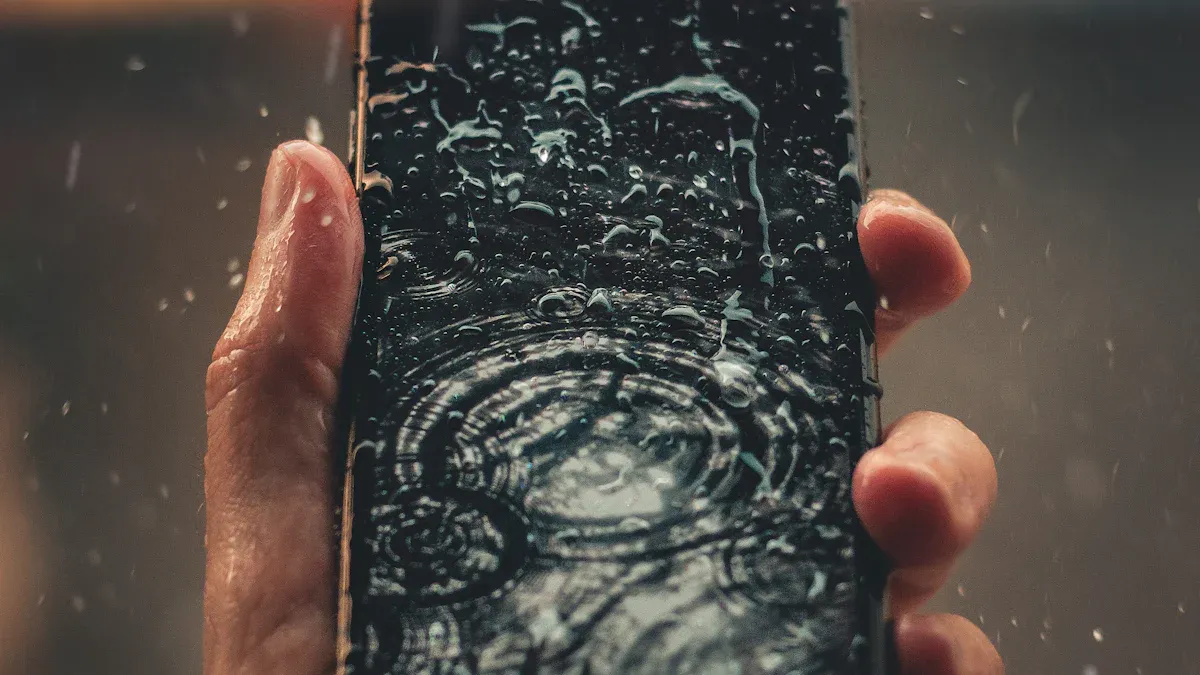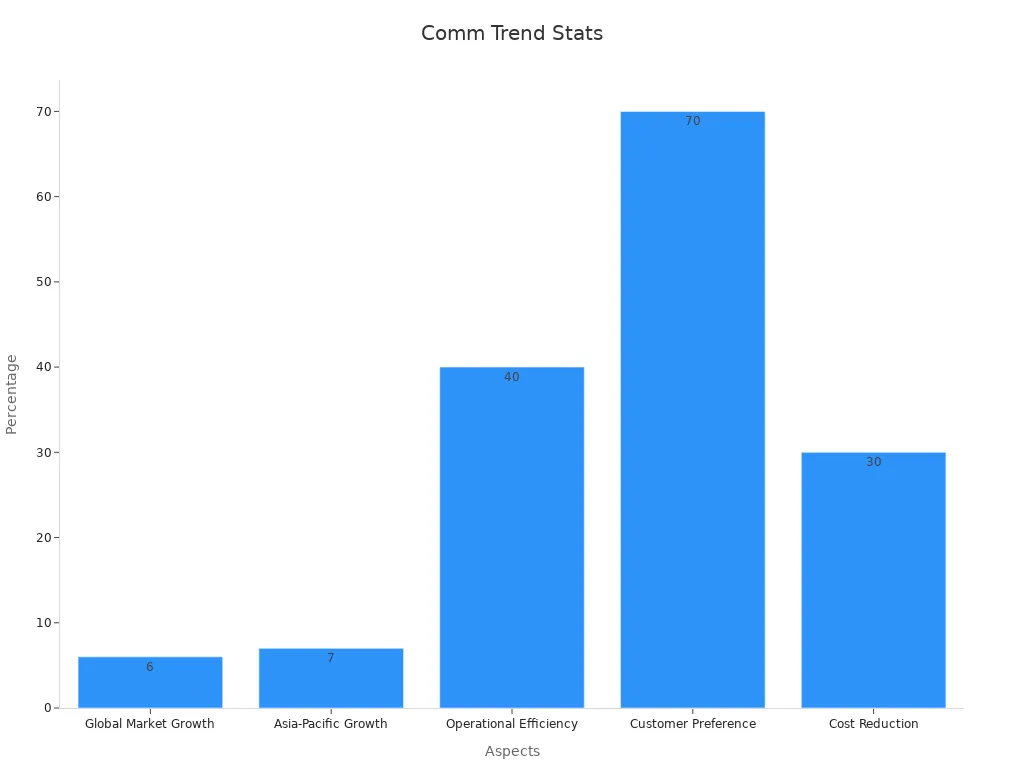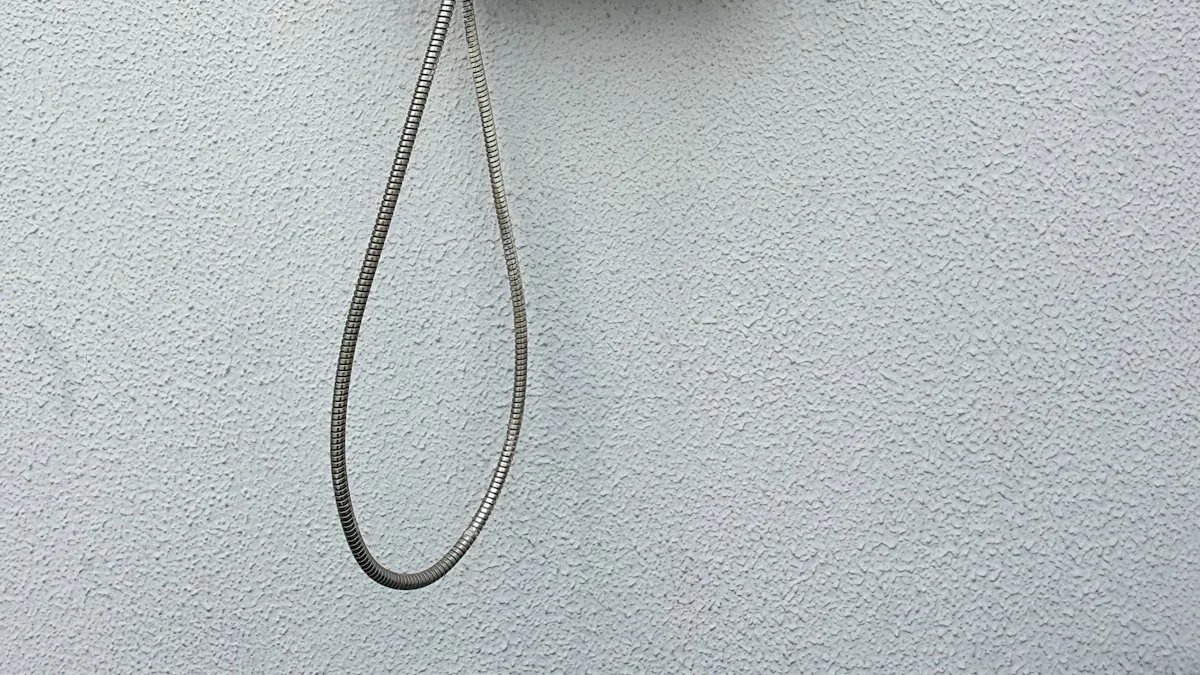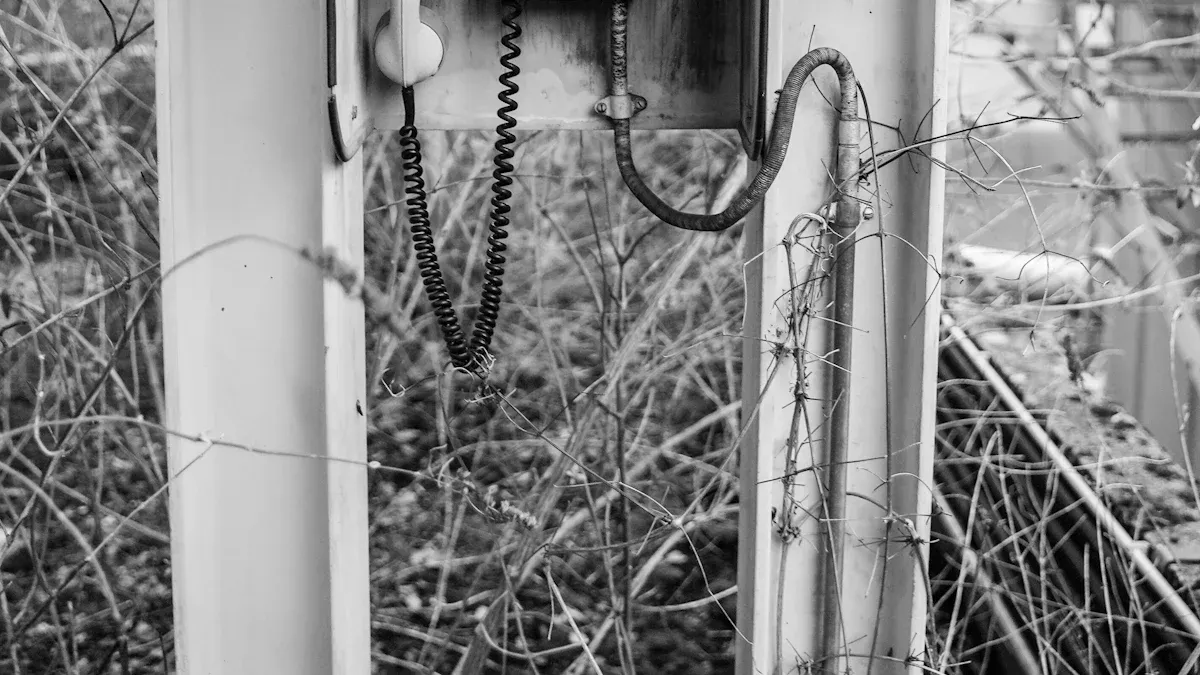
People often depend on a rainproof weatherproof telephone when they need to talk outside during storms or harsh weather. These phones, like an IP67 weatherproof telephone or an analog weatherproof telephone, help keep conversations clear even as rain pours. The chart below shows how reliability keeps improving every year.

Rainproof Weatherproof Telephone: Definitions and Differences

Rainproof Telephone Explained
A rainproof telephone helps people communicate outdoors when it rains. This type of phone keeps water out, so the inside parts stay dry. Most rainproof telephones have a special rating called an IP rating. The rating shows how well the phone blocks dust and water. For example, an IP65 rating means the phone can handle rain and low-pressure water jets. The phone’s case is strong and often made from tough materials like aluminum or steel. These materials stop rust and damage from the weather. Some rainproof telephones also have features like a loud ringer and a strong cord to keep calls clear, even during storms.
- IP ratings help people choose the right phone for their needs.
- Rainproof telephones work well in places with light to heavy rain.
- Regular cleaning and checking the seals keep the phone working longer.
Weatherproof Telephone Explained
A weatherproof telephone does more than just block rain. It protects against many outdoor dangers, such as dust, snow, wind, and even salt from the sea. The case is usually made from strong plastics or metals that do not rust. These phones can handle very hot or cold temperatures, from -40°F to 140°F. Some models have a bright display that works in the dark or cold. The buttons are big and easy to press, even with gloves. Weatherproof telephones often use special microphones that block out loud noises, so people can hear each other clearly.
| Feature Category | Details |
|---|---|
| Protection Rating | IP66 (keeps out dust and strong water jets) |
| Housing Material | Shock-resistant plastic or aluminum |
| Environmental Resistance | Works in high humidity, salty air, and strong winds |
| Operating Temperature | -40°F to 140°F |
| Audio Features | Loud ringer and noise-cancelling microphone |
| Power Options | Power over Ethernet or regular power supply |
Weatherproof telephones are common in places like highways, factories, and outdoor parks. They keep working even when the weather gets rough.
Key Differences Between Rainproof and Weatherproof
Rainproof and weatherproof telephones both help people talk outside, but they are not the same. Rainproof telephones mainly protect against rain and some dust. Weatherproof telephones offer more protection. They block out rain, snow, dust, wind, and even chemicals in the air. The table below shows some key differences:
| Feature | Rainproof Telephone | Weatherproof Telephone |
|---|---|---|
| Main Protection | Rain, light dust | Rain, snow, dust, wind, salt |
| IP Rating Range | IP54 to IP65 | IP66 or higher |
| Housing Material | Aluminum, steel | Plastic, aluminum, steel |
| Temperature Range | Moderate | Extreme hot and cold |
| Extra Features | Loud ringer | Noise-cancelling mic, display |
Tip: When choosing a rainproof weatherproof telephone, think about the weather in your area. If you only need to block rain, a rainproof model may work. If you face snow, dust, or strong winds, a weatherproof telephone is a better choice.
A rainproof weatherproof telephone with a higher IP rating and strong case will last longer and keep calls clear, even in tough outdoor conditions.
Key Features of Rainproof Weatherproof Telephone for Outdoor Use

IP Ratings and Their Importance
IP ratings play a big role in how well a rainproof weatherproof telephone works outside. These ratings tell people how much protection the phone has against water and dust. For example, the Grandstream WP836 wireless IP phone has an IP67 rating. This means it can handle dust, rain, and even cleaning chemicals. Phones with IPX4 can stand up to splashes and light rain. IPX5 and IPX6 ratings mean the phone can survive heavy rain and water jets. If someone drops a phone with an IPX7 rating in a puddle, it can stay underwater for up to 30 minutes and still work. IPX8 goes even further, letting the phone handle long periods underwater.
Here’s a quick look at what different IP ratings mean:
| IP Rating | What It Protects Against | Where It Works Best |
|---|---|---|
| IPX4 | Splashes, light rain | Parks, playgrounds |
| IPX5/IPX6 | Heavy rain, water jets | Construction sites, highways |
| IPX7 | Short-term submersion | Docks, rainy sports fields |
| IP67 | Dust, full water immersion, chemicals | Factories, harsh outdoor settings |
Phones with higher IP ratings last longer and keep working, even when the weather gets rough. Testing for these ratings happens in labs, where experts spray water, blow dust, and dunk the phones to make sure they hold up. People can trust these ratings because independent labs check them.
Tip: Always check the IP rating before buying a rainproof weatherproof telephone. A higher number means better protection.
Sealed Components and Construction Quality
The way a rainproof weatherproof telephone is built matters just as much as its rating. Good phones use sealed parts that keep water and dust out. Makers use strong materials like aluminum, steel, or tough plastic. They also use special seals around buttons, speakers, and wires. These seals stop water from sneaking inside and causing damage.
Research shows that waterproof and corrosion-resistant designs help phones last longer in tough places. If a phone has weak seals or poor construction, water can get in and ruin the inside parts. Experts say that using the right materials and building phones with care makes a big difference. Even small mistakes in sealing can let in air or water, which can lead to problems over time.
- Sealed connectors keep out rain and dust.
- Corrosion-resistant materials stop rust and damage.
- Careful workmanship means fewer leaks and longer life.
Phones with strong construction keep working, even after years of use in rain, snow, or salty air.
Protection Against Environmental Factors
A rainproof weatherproof telephone does more than just block water. It also stands up to other outdoor dangers. These phones can handle dust, wind, snow, and even chemicals in the air. Some models work in freezing cold or blazing heat. Others have noise-cancelling microphones, so people can hear each other even when it’s windy or loud outside.
Here are some ways these phones protect against the environment:
- Thick cases shield the inside from bumps and drops.
- Special coatings stop salt and chemicals from eating away at the phone.
- Wide temperature ranges let the phone work in both hot summers and icy winters.
- Bright displays and big buttons make the phone easy to use, even with gloves.
The Grandstream WP836, for example, uses a tough case and advanced noise reduction. It keeps working in rain, dust, and even when cleaned with strong chemicals. This makes it a great choice for places like factories, highways, or parks.
🛡️ Note: A rainproof weatherproof telephone with strong protection features will keep people connected, no matter what the weather brings.
Limitations and Choosing the Right Rainproof Weatherproof Telephone
Limitations of Rainproof and Weatherproof Protections
Rainproof and weatherproof telephones work well in tough weather, but they do have some limits. Some waterproof cases, like the LifeProof FRĒ and OUNNE, show that keeping water out can also block sound. When a phone is tightly sealed, it can make voices harder to hear. This happens because the case keeps both water and sound from getting in or out. People may notice that calls sound quieter or less clear. Some cases also warn against using them in deep water for a long time. Not every product has the same level of protection, so users should always check the ratings and instructions.
⚠️ Note: There is often a trade-off between keeping water out and letting sound through. Users should test the phone in real conditions before relying on it for emergencies.
How to Choose the Right Telephone for Your Needs
Choosing the right rainproof weatherproof telephone depends on where it will be used. Some phones are made for factories, while others work better on highways or in parks. Here are some tips to help pick the best one:
- Match the phone to the environment. For example, use explosion-proof phones in oil and gas areas.
- Look for phones with strong cases if vandalism or shocks are likely.
- Pick models with features like noise-cancelling microphones for loud places.
- Check if the phone can handle the temperature and humidity in your area.
A table can help compare options:
| Environment | Best Phone Type | Key Feature |
|---|---|---|
| Factory | Metal analog VoIP | Strong housing |
| Oil & Gas | Explosion-proof heavy-duty | Extra safety |
| Clean Room | Emergency handsfree | Easy to clean |
| Outdoor Park | Weatherproof with loud ringer | Noise-cancelling mic |
Maintenance Tips for Longevity
Taking care of a rainproof weatherproof telephone helps it last longer. Here are some easy steps:
- Wipe the phone with a dry cloth after heavy rain or snow.
- Check seals and covers for cracks or wear.
- Test the ringer and microphone often to make sure they work.
- Follow the maker’s cleaning instructions, especially if the phone is near salt or chemicals.
🛠️ Tip: Regular checks and cleaning keep the phone working well, even after years outside.
Choosing the right phone matters. Rainproof phones handle splashes and short dips, while weatherproof models survive deeper water and tough weather. The table below shows key differences:
| Feature | Rainproof Phones | Weatherproof Phones |
|---|---|---|
| IP Rating | IP67 | IP68 |
| Water Exposure | Up to 1 meter, 30 min | Over 1.5 meters, 30+ min |
| Durability | Dust, sand, dirt | Long-term wet use |
People should always check the IP rating and match the phone to their outdoor needs. Regular cleaning and seal checks help any rainproof weatherproof telephone last longer.
FAQ
What does the IP rating mean on a telephone?
The IP rating shows how well the phone blocks water and dust. Higher numbers mean better protection. People can check this rating before buying.
Can a weatherproof telephone survive freezing temperatures?
Yes, most weatherproof telephones work in very cold weather. Some models keep working at -40°F. Always check the specs for temperature limits.
How often should someone check the seals on their outdoor phone?
People should check the seals every few months. Look for cracks or wear. Good seals help the phone last longer and keep working outside.


